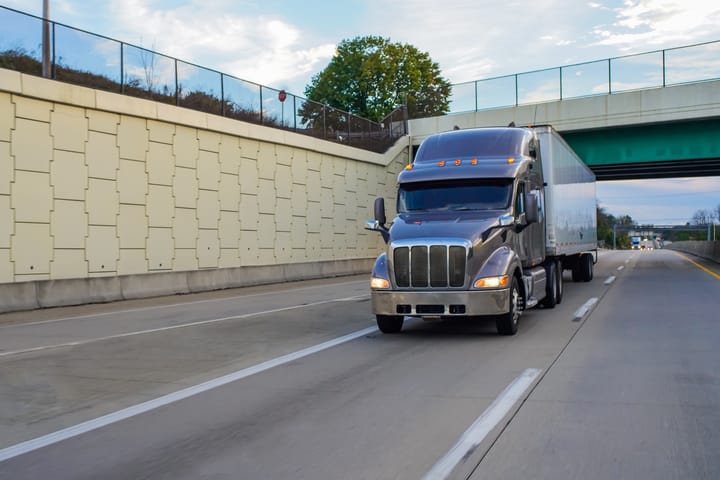These fleets pay
Plus: State trucking orgs sound the alarm on tariffs

Fleet safety tech is getting smarter—and more accessible. But is it actually helping small carriers? We spoke to a tech leader about what’s working, what’s not, and how to invest without overspending.
Meanwhile, the FMCSA just voided thousands of driver medical certs, creating compliance headaches for fleets nationwide.
Also in this issue: the top-paying fleets right now, and how Uber Freight is using AI to tackle inefficiencies across the supply chain.

An exciting future for fleet safety
Fleets big and small put safety at the top of their priority lists, but the investments and resources needed to acquire the latest safety tech can sometimes present a financial burden to small businesses.
The good news is, there's a trend toward embedded safety tech, rather than having to make expensive aftermarket purchases. We caught up with Marcus Newbury, COO and co-founder of Driver Technologies, to hear more about what's going well in fleet safety tech, and where there's room for improvement. -Shefali Kapadia
What are the biggest safety lapses you typically see with truck drivers of small fleets or owner-operators?
Smaller fleets tend to underinvest in safety due to budget constraints, a belief that fewer vehicles mean lower risk or an informal approach to operations. Safety risks don’t scale linearly. Every fleet driver should go through the same type of training and have the same access to safety tools in their vehicle. It’s important to be cognizant of the need for safety training and technology, regardless of how many vehicles are in the fleet.
What are some areas where fleets have made big strides in improving safety?
Fleets are implementing aftermarket cameras and telematics devices to improve coaching and awareness of what's happening on the road. They are increasingly becoming part of the connected car ecosystem, especially as newer fleets are equipped with connected capabilities. Some companies, like ours, are beginning to offer fleet management solutions that include an Android Automotive integration, which is embedded directly into the vehicle instead of purchasing aftermarket solutions.
What excites you about trucking technology today?
The embedded nature of the technology within the trucking industry is incredibly exciting because aftermarket hardware is expensive and can be challenging to install. In a fleet, there are different vehicle ownership and usage scenarios. Some vehicles have multiple drivers, some are owned by individual drivers and others are company-owned. This situation requires a flexible approach, such as allowing drivers to use a phone app, installing dedicated devices or switching profiles based on who is driving. Implementing embedded third-party apps is game-changing, whether it brings ADAS functionality to consumer vehicles or trucks, fleet management tools or embeds dash cam solutions.
How can small trucking businesses adopt safety tech in a cost-effective way?
There’s a plethora of aftermarket tools that can immediately help small trucking businesses with safety in a cost-effective way. Small trucking businesses can adopt safety tech by using Android Automotive OS (AAOS) and third-party apps that can decrease the price of accessing your own driver data such as telematics. In turn, proving that good driving behavior through data could lead to lower insurance premiums.
Beyond these primary benefits, third-party platforms could offer additional rewards for drivers based on driving behavior, such as discounts on gas or other perks related to driving habits and the time of driving. These incentives would provide added value for drivers who participate in data-sharing programs.

Hybrids may pave the future of commercial powertrains
Depending on your perspective, you may think hybrid vehicles offer the best of both worlds—or the worst of both worlds. The technology can be complex and cost-intensive to build and maintain.
Jeff Seger of the North American Council for Freight Efficiency thinks hybrids might start to proliferate in commercial trucking. They reduce fuel costs, making them attractive to fleets. And they may also be the solution to meeting changing emissions regulations.
Seger poses the question: "Can hybrids be a good lever to meet regulations in whatever form they take?"
Why this matters: The complexity of heavy-duty vehicles has prevented hybrid technology from making a big impact in the industry. But that may not be true in the future, as OEMs look to continue developing emissions-friendly vehicles and fleet managers seek improved sustainability and reduced costs.
Get more details at CCJ Digital.

PAY UP: Top 10 trucking companies offering highest salaries
MURDER PLOT: Dispute over truck depot ownership led to staged assault
DONUT GONE WRONG: BMW crashes into truck on Calif. freeway
ACT DOA: Maryland Gov. delays enforcement of Advanced Clean Trucks
ENGLISH REQUIRED: Arkansas enacts fines for truckers lacking English proficiency.

"In chaos, there can be cash. You just have to figure out the right song to sing to those people that need the help."- Timothy Dooner, host of WHAT THE TRUCK?!?
Amid the volatility in the freight market, there's one stable truth: goods are still coming in and out of the country, and they'll need to be on a truck at some point. For fleet executives, understanding what shippers need and how to differentiate the business is critical to keep cash flowing, as Dooner discusses on his podcast. Listen to it here.

Thousands of drivers at risk after FMCSA voids medical certificates
The Federal Motor Carrier Safety Administration has voided thousands of medical certificates. The reason: the identified doctors didn't adequately perform physical exams for commercial vehicle operators. The action affects more than 15,000 CDL holders.
Why this matters: The void doesn't immediately disqualify a trucker from driving, but they will have to obtain a new medical certificate by May 10. It's something fleet managers will need to watch for to ensure their drivers' CDLs aren't downgraded. (Overdrive)
State trucking groups voice concerns about tariffs
With reciprocal tariffs paused and a baseline 10% tariff in place in the meantime, state trucking groups are expressing their worries about the import taxes. Oregon's association noted tariffs would decrease freight demand, and Washington voiced concerns about cross-border trade.
Why this matters: Tariff policies are changing frequently, which puts trucking companies and the associations that represent them on high alert as they try to find stability amid the uncertainty. (Trucking Dive)
Kenworth postpones production of hydrogen tractor
Kenworth is pushing back production of its hydrogen fuel cell electric T680 tractors. Manufacturing won't start this year as previously announced. The OEM's chief engineer says Kenworth is working on calibrating the truck and wants to ensure proper fueling infrastructure.
Why this matters: Hydrogen fuel-cell truck makers have had a rough start to the year, with Hyzon shutting down and Nikola filing for bankruptcy. Despite a lot of potential benefits, the technology hasn't caught on the way battery-electric trucks have, in part because of a lack of available hydrogen fueling stations. (Transport Topics)

Uber Freight taps AI to help trucking companies
Brokering platform Uber Freight is using AI to help improve efficiency in logistics. It's tackling deadheading and empty miles by matching trucks to loads using AI, and agentic AI shortens the wait time for customer service requests.
Why this matters: Various players in the supply chain are increasingly using AI to solve common inefficiencies and aid human workers. With an estimated 35% of trucks driving empty miles at any given time, using AI to reduce deadheading would improve productivity and save costs for fleet owners and their drivers. (Business Insider)

Freight groups support bill battling supply chain crime
Several major trucking associations are uniting to support the Combating Organized Retail Crime Act, which would focus on enforcement, legal frameworks and coordination among federal, state and local agencies to fight against cargo theft.
Why this matters: Supply chain crimes cost up to $35 billion every year, so it's no surprise trucking groups are voicing their support for reforms that could help tame cargo theft. (The Trucker)

Thanks for reading today's edition! You can reach the newsletter team at editor@theinsidelane.co. We enjoy hearing from you.
Interested in advertising? Email us at newslettersales@mvfglobal.com
The Inside Lane is curated and written by Shefali Kapadia and edited by Bianca Prieto.





Comments ()